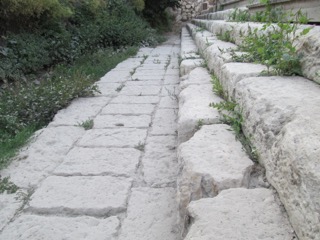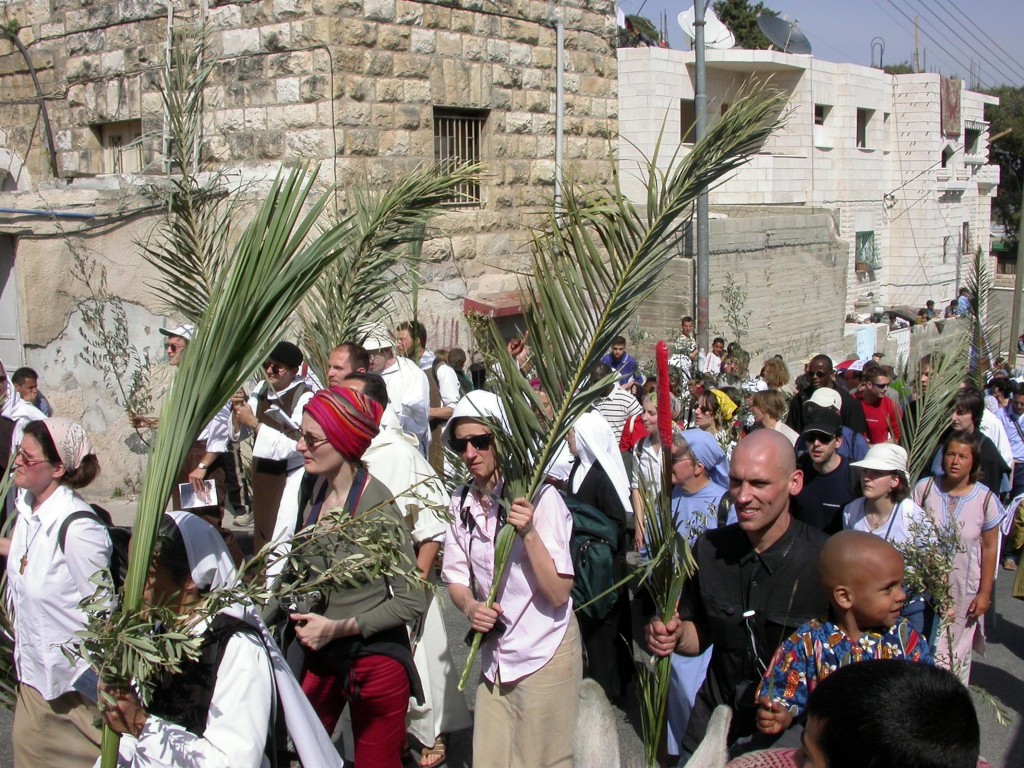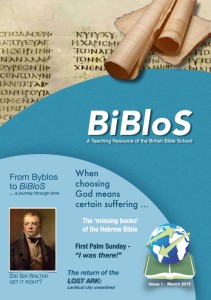The first time I saw Jesus was from a great height, which is a statement that requires explanation. I am involved in Temple security in Jerusalem. I am not a priest – I do not have the priestly line of Aaron – but I am of the tribe of Levi and so am permitted to help the priests in their duties. My responsibilities lie in keeping the holy Temple and its surroundings peaceful and orderly. And, when required, to do the same elsewhere in the Holy City.  On the day I saw Jesus I had been sent to the South Gate, the one close to the Pool of Siloam, if you know Jerusalem. I had been detailed to assist the Romans as this was the week before the Passover festival when pilgrims flock in to the City. The visitors are faithful Jews from across the land and indeed from throughout the Roman Empire and even beyond. The wealthy lodged in the city and the not-so-wealthy found cheaper places to stay outside and walked in each day.
On the day I saw Jesus I had been sent to the South Gate, the one close to the Pool of Siloam, if you know Jerusalem. I had been detailed to assist the Romans as this was the week before the Passover festival when pilgrims flock in to the City. The visitors are faithful Jews from across the land and indeed from throughout the Roman Empire and even beyond. The wealthy lodged in the city and the not-so-wealthy found cheaper places to stay outside and walked in each day.
The Romans tended to leave routine security to us but during the run up to Passover they got a bit twitchy. They did not like the crowds so all leave was cancelled and a special watch was kept for known trouble-makers to stop them from entering the City. Trouble-makers like crowds; they find them a good place to hide. So a watch was kept at all gates. A “visible presence” was how they described it. And with all Roman detachments a local translator. In this case, me. So I spent the day high above the gateway looking down the road as it climbed up to the City. For much of the day there was little to do. The people were cheerful and in a holiday mood. Just occasionally a suspect would be spotted and brought in for questioning. Very few spoke Latin and some had no Greek either which was when I was called in.
As I say, it was relatively quiet that year. Relatively. The Romans had brought in some trouble-makers not long before. Barabbas and his gang: a bad lot. The other hot-heads were angry but they were all talk and no action. The Romans were watchful but not tense. By late afternoon the officer in charge was talking about standing down some of his squad. More pilgrims were leaving than arriving and the gates would be shut at dusk. But then we heard shouting and I was told to translate. To me it sounded like Hosanna which was what I told the officer. He told me that I was there to translate not to repeat what they could all hear for themselves. I told him that Hosanna was religious: a traditional Hebrew shout of praise.
“Praising what,” he asked.
“Our God,” I replied.
“Should I be alarmed?” he asked, resting his right hand on the pommel of his sword.
I wanted to tell him that he and all his accursed army of occupation should be very afraid. That one day every Roman in the country, in my country, would be driven out. One day. But for now I kept my peace and explained that all Hosanna meant was that the people were in high spirits as they looked forward to the festival. All this was true but not quite the whole truth. Hosanna is Hebrew, the language of the educated. But for most of us who speak Aramaic rather than Hebrew, Hoshanna means something different: Save us! Set us free! But I thought there was no reason to trouble the Romans with too much information.
 By now the crowd had come into view as they followed the winding path up from Bethany. Some were waving branches. The officer wanted to know what that was all about and then answered his own question as he saw they were palm branches. He knew that for us palm branches were a national emblem. We Jews are well known for not using pictures or statues and this Roman had heard that palm branches were almost a kind of national flag. Was he going to put two and two together? I had to admit that I had no idea what was happening but kept that knowledge – or lack of it – to myself. There was no way I was going to tell a Roman that I was puzzled. But then I saw the centre of attention: a man riding on a donkey. I started to bluff. See that man on the donkey, I said. He must be an important rabbi, a teacher of our holy law. The people are showing their respect to him and thus to our Law and our God. Well, it sounded convincing to me. What I wasn’t saying was that the donkey was significant. You may know that we have a tradition that dated back to when we had our own kings. Great men like David and Solomon. When a king went out to war he rode on his war horse but when he came back he rode a donkey. I suppose it was a way of showing that the war was over. Anyway, when the king returned – assuming he had won – the people would flock out of Jerusalem to welcome him home. Cheering and waving palm branches. And then there was a prophecy that the Romans didn’t need to know about. The Prophet Zechariah promised that one day a son of David would return to David’s City, riding on a donkey.
By now the crowd had come into view as they followed the winding path up from Bethany. Some were waving branches. The officer wanted to know what that was all about and then answered his own question as he saw they were palm branches. He knew that for us palm branches were a national emblem. We Jews are well known for not using pictures or statues and this Roman had heard that palm branches were almost a kind of national flag. Was he going to put two and two together? I had to admit that I had no idea what was happening but kept that knowledge – or lack of it – to myself. There was no way I was going to tell a Roman that I was puzzled. But then I saw the centre of attention: a man riding on a donkey. I started to bluff. See that man on the donkey, I said. He must be an important rabbi, a teacher of our holy law. The people are showing their respect to him and thus to our Law and our God. Well, it sounded convincing to me. What I wasn’t saying was that the donkey was significant. You may know that we have a tradition that dated back to when we had our own kings. Great men like David and Solomon. When a king went out to war he rode on his war horse but when he came back he rode a donkey. I suppose it was a way of showing that the war was over. Anyway, when the king returned – assuming he had won – the people would flock out of Jerusalem to welcome him home. Cheering and waving palm branches. And then there was a prophecy that the Romans didn’t need to know about. The Prophet Zechariah promised that one day a son of David would return to David’s City, riding on a donkey.
Of course the Romans did not know any of this but they did recognise a public order offence when it came cheering up the hill towards them. The officer sent a runner up to HQ to report and I was sent back to inform the High Priest.
At this point I had no idea that the man on the donkey was Jesus and from where I was watching I could not see him clearly. But I did see a lot more of him over the next week. If you are interested perhaps I can tell you more some other time.
Shalom.
P. S. You can read a little background to this article on our web site here.
Steven Whitehead
 This article is from BiBloS, a teaching resource of the British Bible School. To read more articles or download the whole of Issue 1, click here.
This article is from BiBloS, a teaching resource of the British Bible School. To read more articles or download the whole of Issue 1, click here.
